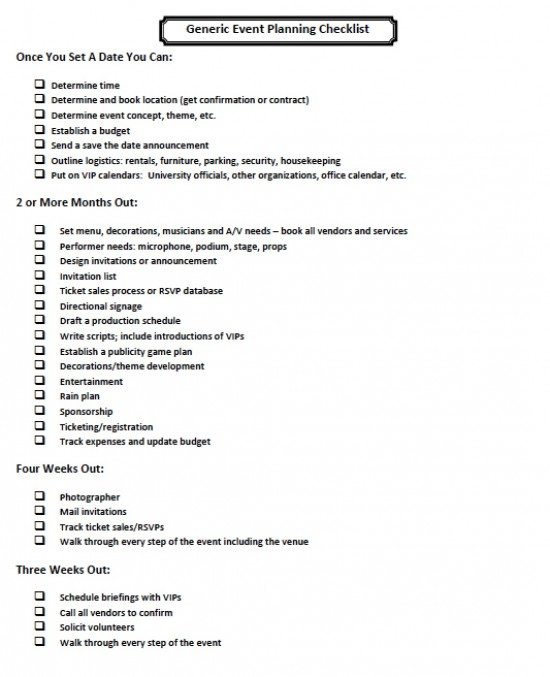Download the Event Planning Checklist that has been created specifically to make planning any event easy. Use organizer to address all aspects of planning an event, from brainstorming to creating a budget and much more.
Sample
How To Write
Step 1 – Section 1 – Naming and Tentatively Scheduling an Event:
- Name of Event (enter the title of the event onto the line)
- Date (of event)
- Time (of event)
- Location
- Event Purpose
Step 2 – Section 2 – Advertising –
- Decide, name and enter the name of the person who will be the officer in charge of advertising
- Check the boxes of the forms of advertising that will be considered
Step 3 – Section 3 – Brainstorming
- Check the boxes as they have been addressed
- Will the event work?
- How many people do you need to make the event happen?
- Does the event serve a need previously not met on campus?
- Do we have the resources to make it happen?
Step 4 – Section 4 – Budgeting –
- Utilize the budgeting sheet that is included in these documents attached
Step 5 – Section 5 – Shopping –
- This is a basic list of supplies any event generally requires. If more supplies are required, place them into your budget and on the “other” lines
- Silverware
- Plates
- Napkins
- Cups
- Decorations
- Cash box
- Items that are performer specific/requests from your performer(s)
- Other
Step 6 – Section 5 – Scheduling Your Event
- Officer in Charge – Decide your officer in charge and enter their name
- Speak with the appropriate room reservation office and decide the following:
- What size room will you require?
- What sort of tech needs do you have
- What can you afford according to your budget?
- Tentatively book more than one date
- Contact your performer or vendor (if this applies to your event)
- Contact the reservation office to confirm your date once it’s decided
- Schedule a time to meet and confirm tech needs and set up of the room
- Schedule all arrangements for your performer to include all transportation
- Schedule hotel arrangements and make dinner arrangements/reservations for your performer
Step 7 – Section 7 – Permits – If this is for a school, college or university – see your Student Group Handbook to determine if permits are needed)
- Officer in charge – Decide who will handle permits for your event and enter their name: If this isn’t an education facility the following permits may be required:
- Food
- Outdoor Space
- Alcohol Permit
- Sound Permit
- Sanitation
- Sales/Fundraising
- Security
- Film License
- Other
Step 8 – Section 8 – Grants and Fundraising
- Decide your officer in charge of Grants and Fundraising, then enter their name
- If you’re applying for grants, did you get your applications in by the deadline?
- Have you schedule a grant committee meeting?
- What measures will you be taking to ensure that you will have the ability to pay your performers in advance?
Step 9 – Section 9 – One Week Prior
- Name your officer in charge and enter their name on the line
- Contact all reservations to be certain that the details are absolutely secured
- Call SAO to be certain all permits are in place, signed and prepared to retrieve
- Make contact with the performer(s) to be sure travel arrangements are secured
- Assign all shifts for group volunteers for set up and removal
- Create and purchase or print any programs and/or fliers for the event
Step 10 – Section 10 – Day of Event –
- Name of your officer in charge of the “day of” tasks
- Pick up your Performer(s) and/or Vendor(s) and get them to your appropriate location
- If your Performer(s) have requests either compile a list in the dressing room area if possible
- Meet your vendors at the event site and assist with set up if needed
- Greet guests at the door or place a greeter at any entrance available for guests
- Once the event has been completed begin clean up – check again with regard to your reserved location and any clean up policies
Step 11 – Section 11 – After the Event
The Officer in Charge should attend to the thank you notes for all who were involved
- Meet with the others involved in the event to do the “post event evaluation” sheet attached
- It’s most important to be certain that all bill and grant paperwork is completed on time.

